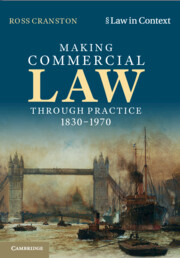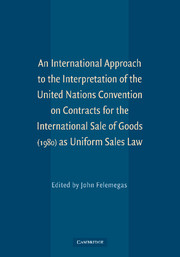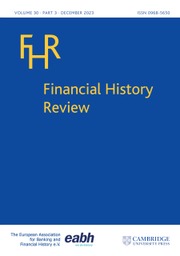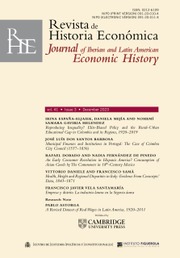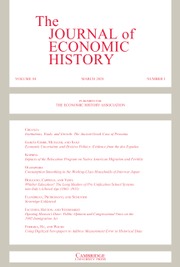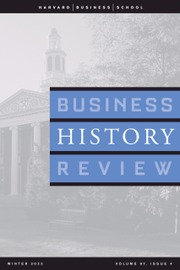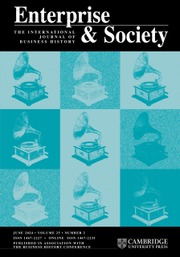Making Commercial Law Through Practice 1830–1970
Part of Law in Context
- Author: Ross Cranston, London School of Economics and Political Science
- Date Published: August 2022
- availability: Available
- format: Paperback
- isbn: 9781316648377
Paperback
Other available formats:
Hardback, eBook
Looking for an inspection copy?
This title is not currently available on inspection
-
Making Commercial Law Through Practice 1830–1970 adds a new dimension to the history of Britain's commerce, trade manufacturing and financial services, by showing how they have operated in law over the last one hundred and forty years. In the main law and lawyers were not the driving force; regulation was largely absent; and judges tended to accommodate commercial needs, so that market actors were able to shape the law through their practices. Using legal and historical scholarship, the author draws on archival sources previously unexploited for the study of commercial practice and the law's role in it. This book will stimulate parallel research in other subject areas of law. Modern commercial lawyers will learn a great deal about the current law from the story of its evolution, and economic and business historians will see how the world of commerce and trade operated in a legal context.
Read more- Demonstrates the use to which lawyers can put archives
- Sheds light on key legal issues relevant to trade, trade financing and distributing and financing manufactured goods
- Aimed at law students, practitioners and historians
Reviews & endorsements
'The author has drawn on an impressive range of source material-the detailed footnotes to the text refer to contemporary accounts of commercial practice, economic and historical studies, business and banking archives, law reports of the period, and a number of victorian literary extracts whose charecters convey the sentiments of the time. This is undoubtedly an important work.' Nikki Singla, Counsel Magazine
See more reviews'… superb volume … It is impossible within the compass of this review to do justice to the wealth of learning and historical data contained in this superb work. It is not only legal historians but all those interested in the evolution of commercial law who will derive both profit and pleasure from reading it.' Professor Sir Roy Goode, Journal of International Banking and Financial Law
'… a work of impressive scholarship, drawing on many original sources including business and bank archives … [It] is not only of great historical interest. It is a timely reminder that English commercial law needs constantly to adapt to the changing needs of commerce.' George Leggatt, Law Quarterly Review
'Ross Cranston's fine study sheds new light on how English commercial law has been made. The analysis presented is a humbling one for commercial lawyers and judges. What emerges is how much commercial law was established by the market participants, with little involvement of lawyers, and still less of the courts or the state. The particular contribution of the book is Professor Cranston's illumination of the role of non-state institutions and organizations in such 'private law-making'. Drawing on an impressive range of sources, he explores the essential role played in the process by the commodity exchanges, trade associations, auctioneers and clearing houses of nineteenth-and earlyt wentieth-century Britain.' Christopher Butcher, The Journal of Legal History
'The first main point of interest in Making Commercial Law is the detailed analysis of how English law and English courts shaped the normative environment within which markets expanded, in England and in a large part of the world … the first introductory chapter (pp. 1–60) should be a must-read for any historian with even a passing interest in the operations of nineteenth-century markets or in the way the Common Law shaped those markets - and not as a dummy variable.' Jérôme Sgard, The Journal of Economic History
'… an ambitious, dense book that is obviously the culmination of a lifetime of scholarship and research. Cranston knows and references the secondary literature and the judicial decisions, but it is his use of archival material that is truly exciting. Trade association and company directors' minute books, solicitors' opinions, standard form contracts, contract books, agency agreements, and more provide an in-depth and on-the-ground view.' Emily Kadens, Rechtsgeschichte – Legal History
Customer reviews
Not yet reviewed
Be the first to review
Review was not posted due to profanity
×Product details
- Date Published: August 2022
- format: Paperback
- isbn: 9781316648377
- length: 527 pages
- dimensions: 245 x 170 x 30 mm
- weight: 0.898kg
- availability: Available
Table of Contents
1. Commercial and Legal Context
2. The Commodity Markets of London and Liverpool
3. Agents, 'Agents' and Agency
4. Sale, Hire and the Distribution of Manufactured Goods
5. International Commodity Sales
6. Bank Finance for Trade and Industry.
Sorry, this resource is locked
Please register or sign in to request access. If you are having problems accessing these resources please email [email protected]
Register Sign in» Proceed
You are now leaving the Cambridge University Press website. Your eBook purchase and download will be completed by our partner www.ebooks.com. Please see the permission section of the www.ebooks.com catalogue page for details of the print & copy limits on our eBooks.
Continue ×Are you sure you want to delete your account?
This cannot be undone.
Thank you for your feedback which will help us improve our service.
If you requested a response, we will make sure to get back to you shortly.
×
